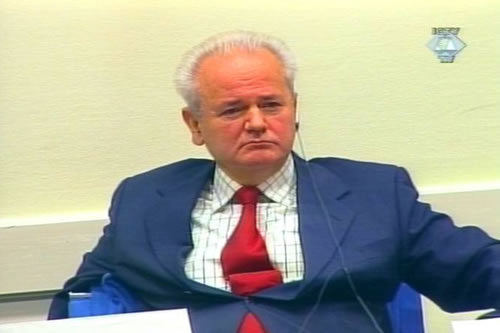Home
CAN A “STUBBORN ACCUSED” BE ASSIGNED COUNSEL?
The second day of hearings on the request by two English lawyers to withdraw as assigned counsel from the Milosevic case is held today. Judges consider it “inconceivable that something that is legally possible cannot be implemented without the consent of the accused.”
 Slobodan Miloševic in the courtroom
Slobodan Miloševic in the courtroom “Is it at all possible to assign counsel to a stubborn accused?” Presiding Judge Patrick Robinson asked himself aloud today.
The answers he received--directly or indirectly--from the parties were split, to say the least. English lawyer Steven Kay considers this to be virtually impossible in the case of Slobodan Milosevic, since the accused refuses any form of cooperation, meaning the assigned counsel receives no instructions from his “client.”
Milosevic himself warns that he “will not give up on his right,” adding that he does “not see any function any assigned counsel might have.” He warned judges in advance that “it is out of the question” that in case he is ill, the trial should continue in the presence of assigned counsel, as ordered by the Appeals Chamber. This decision, in Milosevic’s opinion, exerts “pressure on him not to be sick.”
The judges, however, think “it is inconceivable that something that is legally possible cannot be implemented without the consent of the accused.” According to them, the decision of the Trial Chamber to assign counsel to Milosevic, affirmed by the Appeals Chamber decision, “cannot depend on the good will of the accused.”
Finally, as prosecutor Geoffrey Nice said, “a stubborn accused” not only can be assigned counsel, he must be assigned counsel, both for his own sake and in order to protect the authority and dignity of the Trial Chamber. According to the prosecutor, “the accused cannot be allowed to control the course of the trial and it is not realistic for him to conduct his own defense alone in a case of this scope and complexity.”
This exchange was prompted by the request of Steven Kay and his assistant, Gillian Higgins, to withdraw as assigned counsel from the case. They accepted the role on 3 September 2004. Claiming that they have reached the “point of no return” in exercising the function assigned to them and that they are “mired,” the English lawyers categorically demand to be allowed to withdraw.
The main arguments quoted by Kay at today’s hearing were lawyers’ codes of conduct in force in England, the Netherlands and other countries, which direct lawyers to “act in the best interest of their client” and not to allow “their absolute independence to be compromised by external influences.” According to Kay, in this case the “external influence” would be the insistence of the Chamber that he continues to play the role of assigned counsel.
Prosecutor Nice retorted quite sharply to such arguments, qualifying Kay’s request for withdrawal as “inappropriate in contents and in timing” since it was submitted after the appellate hearing and before the Appeals Chamber rendered its decision. The accused, the prosecutor contends, is not a “client” of assigned counsel, whose duty is to represent him before the court while remaining fully free and independent. The best interests of every accused in criminal proceedings, Nice claims, are “his forensic interests, not interests of publicity and propaganda,” the interests that govern Milosevic’s appearances in court. The prosecution’s view is that the Trial Chamber should not allow the assigned counsel to withdraw.
Steven Kay announced he would present a half-hour reply to the prosecution’s arguments. The first defense witness to be questioned by Milosevic was to be called tomorrow, but Milosevic asked that his testimony be postponed until next week in order to be able to prepare the witness tomorrow. Milosevic also asked for a one-week break in order to be able to prepare the “first wave of witnesses”; judges will decide on his motion tomorrow.
Linked Reports
- Case : Milosevic Slobodan - "Kosovo, Croatia and Bosnia"
- 2004-11-09 KAY: DECISION ON THE ASSIGNMENT OF COUNSEL “UNIMPLEMENTABLE IN PRACTICE”
- 2004-11-03 PREPARATIONS UNDERWAY FOR THE CONTINUATION OF THE MILOSEVIC TRIAL
- 2004-11-01 DEL PONTE FEARS MILOSEVIC WILL GO ON "SICK LEAVE" AGAIN
- 2004-11-11 “TIGHT” DEADLINES FOR MILOSEVIC’S DEFENSE
- 2004-11-16 MILOSEVIC A VICTIM OF DEMONIZATION?
- 2004-11-17 ACADEMY MEMBER SETS “MISCONCEPTIONS” RIGHT
